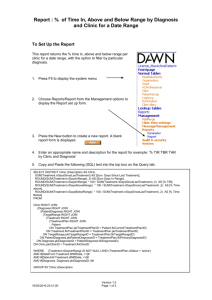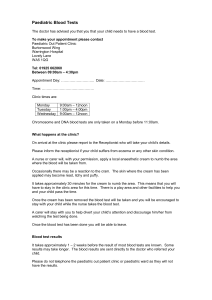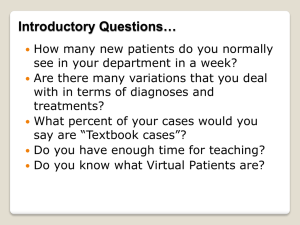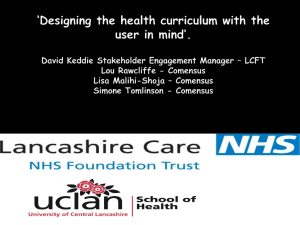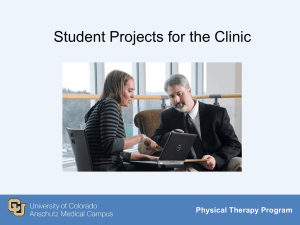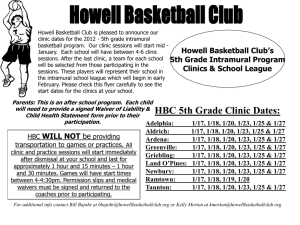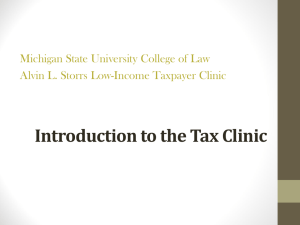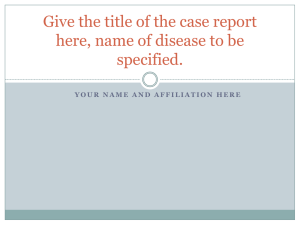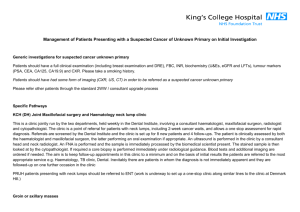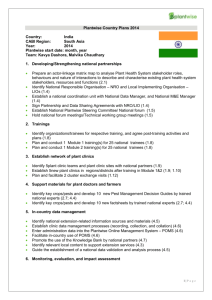Presentation
advertisement
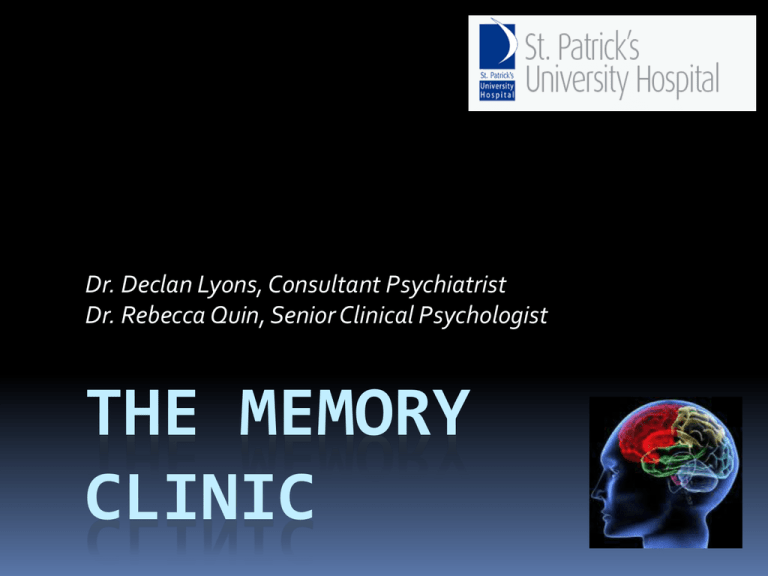
Dr. Declan Lyons, Consultant Psychiatrist Dr. Rebecca Quin, Senior Clinical Psychologist THE MEMORY CLINIC Team Composition Administration Prisca Coleman Psychiatry Dr. Declan Lyons & registrars Clinical Neuropsychology Dr. Rebecca Quin Dr. Karen Looney Clinical Nurse Specialist Gráinne Dempsey Admissions Shane Kirwan Aims of The Memory Clinic Comprehensive assessment To reach a diagnosis or working diagnosis for each individual case To offer, initiate and monitor research based treatments To provide clients, carers and health care professionals with research based information To participate in clinical research To ensure a comprehensive service based on research and good practice standards Current Research The application of magnetic resonance imaging to the study of cognitive processes in older adults. Dr. Arun Bodke, School of Medicine, Trinity College Dublin Profile of older adults attending the Memory Clinic at St Patrick’s hospital The Memory Clinic so far .... 2003 – 2011..... Demographic Details Total population to date: 104 Gender: Male: 49.5% Female: 50.5% Average Age: 66yrs (SD 11.65) Origin: Leinster: 80.4% Munster: 9.3% Ulster: 5.2% Connaught: 5.1% Education: 68% had completed both primary & secondary level (i.e. 13 – 15 yrs) Employment status: Retired/not working: 51.1% Working (part- or full-time): 42.5% Source of Referrals Reason for Referral Diagnosis/Outcome Family History Trends More multi-professional collaborative assessment vs. single discipline evaluation (however discipline that follows patient to community likely to have greatest impact) More patients with depression seeking assessment (greater patient and clinician awareness) Memory clinic at centre of diagnostic network linking in expertise from neuro-imaging, genetics and neuroscience Do more with patient and for longer –not just diagnosis and discharge. The Assessment process - 1 Keyworker assigned MRI brain scan Blood screening Carer interview Neuropsychological testing Feedback Report Recommendations Advice on carer and patient support Assessment process -2 Inpatient -3 working days (cost to insurer only) Single day evaluation: interviews, investigation review, neuropsychology, consensus meeting, feedback 1 week later. 3 day admission facilitates observation (mood, BPSD), MDT assessment meeting, collation of investigations, collateral information. Option to extend: treat depression, neurology consult, initiate cholinesterase inhibitor, extend investigations, carer support and provide session with patient and carer on strategies to enhance memory and cognition. Assessment process - 3 Inpatient brief assessment largely acceptable to patient – occasional explanatory phone call/ meeting needed General hospital facilities available to memory clinic patients (psychoeducation, Evergreen programme/lectures, diversional activities, relaxation, information centre) Comprehensive report (medical/psychiatric history, investigations and their significance, neuropsychology data, consensus opinion re: diagnosis, treatment plan and recommendations, ‘what the patient has been told’, followup plans) Challenges- for our service Home assessment before evaluation valuable but labour intensive More formalised links with voluntary sector/ community services required Carer/ patient support networks could be better organised via hospital Who follows up at the different stages of illness? Need more comprehensive auditing of our service Challenges Greater diagnostic accuracy (especially with arrival of disease modifying compounds for AD) Research and incorporate new technology for assisted living, cognitive remediation in treatment packages Respond to likely increased demand and offer evidence based interventions at earlier stages e.g. MCI Greater ‘systems thinking’ and fostering of links between public/private/voluntary sector along defined investigative and therapeutic pathways. Challenges- for all services Broaden our remit from diagnostic service only to offer more support through longitudinal course of illness Offer more coordinated and comprehensive services for early onset cases where need is greatest Are we challenging barriers to presentation/ stigma? Diagnostic uncertainty may be resource intensive – more comprehensive investigations , prolonged follow up needed. The Memory Clinic, St. Patrick’s University Hospital, James Street, Dublin 8 01 - 2493437 THANK YOU FOR LISTENING
